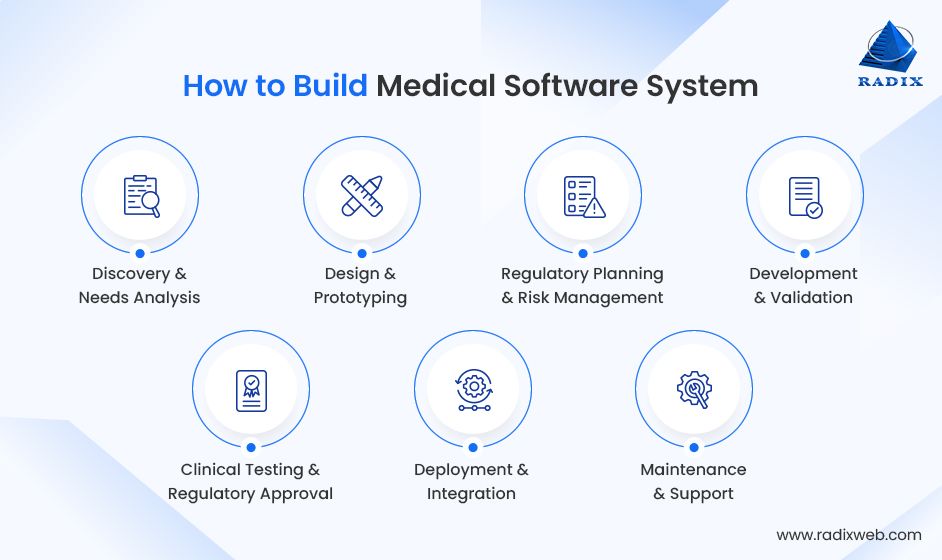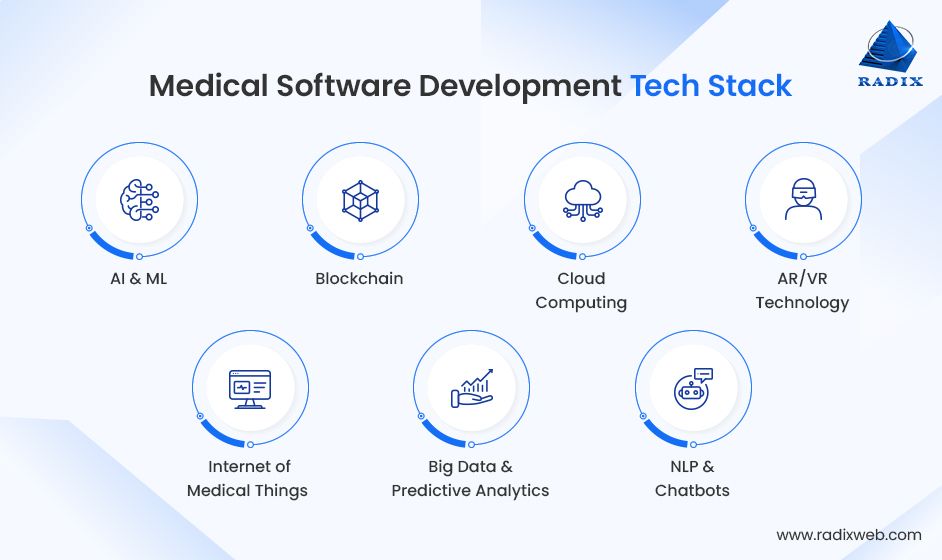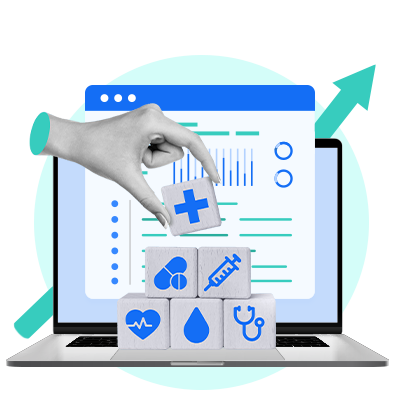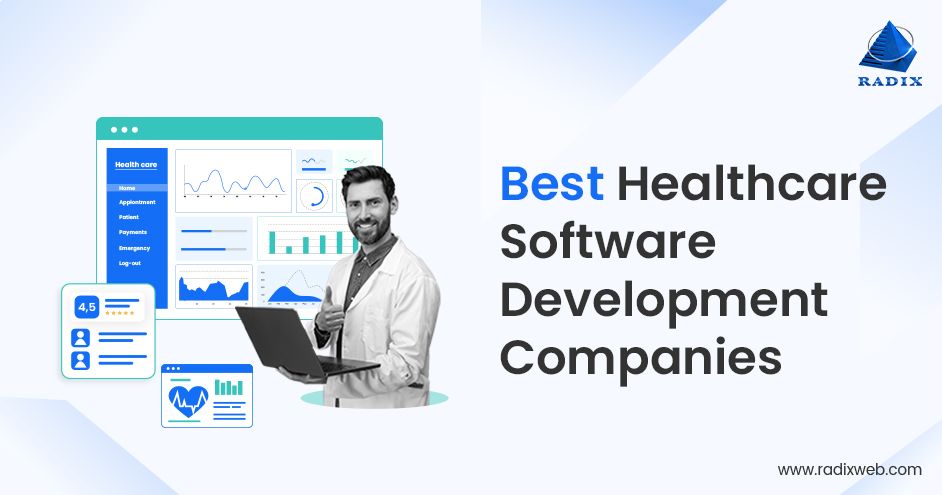Read More

Discover what’s next for AI in healthcare in 2026 - Get Access to the Full Report
ON THIS PAGE
- Understanding Medical Software Development
- Types of Medical Software Solutions
- Benefits of Medical Software Development
- Must-Have Medical Software Features
- Step-By-Step Medical Software Development Process
- Key Medical Software Challenges and Solutions
- The Right Tech Stack for Medical Software Development
- Medical Software Development Cost Estimation
- How to Choose Ideal Medical Software Development Company
- Take the Next Step with Radixweb!
ON THIS PAGE
- Understanding Medical Software Development
- Types of Medical Software Solutions
- Benefits of Medical Software Development
- Must-Have Medical Software Features
- Step-By-Step Medical Software Development Process
- Key Medical Software Challenges and Solutions
- The Right Tech Stack for Medical Software Development
- Medical Software Development Cost Estimation
- How to Choose Ideal Medical Software Development Company
- Take the Next Step with Radixweb!
Quick Summary: Digitization is leading to immense transformation in the medical industry. One such efficient transformation is medical software which helps you enhance the quality of medical care, simplify healthcare business management, and reach out to patients in a more accessible manner -making everyone's work seamless and easy. Read on to understand more about medical software, how medical software development is evolving and current trends.
The healthcare industry is undergoing a significant digital transformation, fuelled by the necessity of enhanced operational efficiency, regulatory compliance, and patient outcomes. At the heart of this shift is medical software solution - a digital asset explicitly built to ensure flawless clinical processes, allow evidence-based care, and manage sensitive patient data. Unlike generic software systems, medical software must abide by strict regulatory protocols such as the FDA, HIPAA, SOC2 and ISO 13485.
The global medical software market is expected to reach around USD 104.1 billion by 2030, growing at a CAGR of 10.9%. These figures prove how vital medical software development has become for the healthcare industry. From streamlining processes to improving patient outcomes, custom medical software solutions now play a key role in upgrading care delivery.
As a renowned medical software development company, Radixweb has always been at the forefront of this significant transformation - developing innovative medical software accustomed to real-world clinical needs. With decades of expertise in healthcare IT services and a grasp of ethical, AI-powered development, we help healthcare organizations to lead through complexity with clarity and resilience.
Want to learn more about what is a medical software and its development process? This guide will walk you through all of it. Excited to learn? Let’s get started!
What Is Medical Software Development?
Medical software development process refers to designing, developing, and maintaining software solutions particularly tailored to support diagnostic, administrative, or clinical functions in the healthcare environment. Several kinds of medical software automate the healthcare process from the aspect of billing to patient scheduling, creating and maintaining patient records, prescribing medications, patient engagement, virtual medical care, virtual scheduling, and more.
How It Differs from Generic Software
Unlike regular software, security-compliant medical software solutions must:
- Integrate with legacy healthcare systems like PACS or EHRs
- Comply with strict security and data privacy protocols like HL7, GDPR, SOC2 or HIPAA
- Undergo clinical validation
- Maintain traceability for CE or FDA approval
Key Stakeholders
- Healthcare providers like telehealth services, hospitals, or clinics
- MedTech manufacturers who are emphasizing on developing software solutions as a medical device
- Payers and administrators like insurers or third-party billing systems
One of our clients, healthcare professional in USA, implemented a medical answering system integrated with HIPAA-compliant infrastructure. It helps improve the patient care and enhance the overall system efficiency.
Different Types of Medical Software Solutions
Our experts have worked alongside healthcare providers from around the world for over two decades, developing different types of healthcare solutions that are secure, scalable, and strategically tailored while keeping real-world clinical processes in mind. And with the advancement of healthcare ecosystem, we’ve consistently developed high-impact software across the these key types:
1. Core Healthcare Systems
- Patient Portals – Secure digital interfaces for patients to book appointments, contact healthcare experts, or review test results.
- Hospital Management Systems (HMS) – These are advanced software systems to manage inpatient labs, care, inventory, etc.
- Medical Billing Software – These medical system software helps with claims processing, reimbursements, and coding.
- Practice Management Software – This software helps schedule, bill, and clinic operations.
- Electronic Health Records (EHR) – It helps centralize patient data systems which further supports clinical workflows and documentation.
2. Specialized and Intelligent Solutions
- Clinical Decision Support Systems (CDSS) – These medical software solutions offer evidence-based suggestions to clinicians.
- Medical Imaging Software – These solutions helps manage analysis, storage, viewing of imaging data.
- Telemedicine Platforms – These SOC2, HIPAA-compliant systems helps with remote consultations.
- AI‑Powered Diagnostic Tools – These tools integrate machine learning model to support diagnoses and notify providers of any anomalies.
3. Regulated and Embedded Solutions
- Embedded Medical Software – These software are integrated into hardware like diagnostic devices, insulin pumps, etc.
- Software as a Medical Device (SaMD) – These are standalone medical software classified under medical device regulations.
Benefits of Developing Medical Software Solutions
Whether you're a specialty clinic, a diagnostic lab, or a hospital network, custom medical software development can be a real game-changer for long-term innovation, higher efficiency, and engagement.
At Radixweb, we not only acknowledge these advantages - we proactively architect them into every medical software solution we deliver. By being current with the emerging tech trends like IoMT, AI, and cloud-native architectures, we help healthcare providers solve real-world challenges with impactful results. Following are key benefits of medical software development:
1. For Healthcare Organizations
- Scalability and Interoperability - The systems are designed and developed to advance with scaling digital infrastructure.
- Operational Visibility - These advanced, analytics dashboards for resource usage and staffing.
- Cost savings - Healthcare software development here helps streamline processes and minimize administrative overhead costs.
2. For Healthcare Providers
- Simplifying Compliance - built-in audit trails, secure data handling, and documentation.
- Decision Support - Digital tools like CDSS and AI-powered imaging aid diagnostics.
- Operational Gains - Automation helps minimize charting time, which further help clinicians to dedicate more time for patient care.
3. For Patients
- Improved Care Results - Medical software solutions helps access proactive monitoring and personalized information.
- Convenience - Developing these custom software integrated with telehealth, provide remote access to records, and appointment reminders.
- Engagement - Mobile app and medical portals helps with adherence and communication.
Must-Have Features of Medical Software Development
Following are the significant features we focus on integrating when developing medical software:
- Transparency and Explainability – This feature is particular important in case of AI, to help maintain accountability and clinician trust.
- Customization/Flexibility – Comes with capability to adapt to evolving process across different specialties or departments.
- Reliability & Uptime – High availability systems with disaster recovery and business continuity planning.
- AI/Analytics Integration – The feature comes with embedded intelligence for operational optimization and clinical insights.
- User-Centric Design – Provides intuitive interfaces for medical software design, which further helps patients and clinicians to reduce errors and training time.
- Scalability and Performance – Cloud-native architectures will help manage rising user data volumes.
- Interoperability – Integrating APIs, HL7, and FHIR for seamless system integration.
- Compliance and Security – These features will make your medical software system SOC2, HIPAA/GDPR-ready, audit logs, and encrypted data handling.
Step-By-Step Medical Software Development Process
Over the years, we’ve designed and developed multiple medical system software accustomed to the unique requirements of healthcare providers. Just recently, our team delivered a fast, UX-rich healthcare app for a Denver-based healthcare service company, which considerably improved their patient engagement and led to measurable boost in client base.

Leaning on this experience - as well as our extensive portfolio of past healthcare development projects - our experts have curated a list of the most crucial steps you can follow to ensure flawless and successful medical software development process.
1. Discovery and Needs Analysis – In this step you determine the clinical workflows, user personas, and compliance needs.
2. Design and Prototyping – Create user-centric medical software design and define system architecture with transparency.
3. Regulatory Planning and Risk Management – Develop a healthcare software with proper quality management aligned to ISO and FDA requirements.
4. Development and Validation – Follow agile or incremental approach for rigorous verification, validation, and documentation.
5. Clinical Testing and Regulatory Approval – Perform clinical assessments and submit documentation to regulators like CE or FDA.
6. Deployment and Integration – Here you seamlessly integrate your medical software solutions with existing systems and train users.
7. Maintenance and Support – In this step, your healthcare software developers need to regularly update your system for usability, security, and compliance.
Top Challenges of Medical Software Development and Their Solutions
Medical software development demands working in a dynamic ecosystem defined by significant scale, intricate complexity, and high sensitivity. From abiding by strict regulatory protocols and integrating legacy systems to managing high volumes of sensitive patient data, software development for healthcare is not a cakewalk.
We've collaborated with different healthcare organizations to transform their clinical and operational processes using cutting-edge technologies. During our journey, we faced and addressed some major challenges in the medical software ecosystem. Here’s our story.
1. Regulatory Complexity and Approval Delays
This is how we overcame:
- Deployed a QA/QMS (Quality Management System) for audit capability and traceability
- Adopted modern design patterns accelerating phased approvals
- Engaged regulatory professionals in the initial design stage
2. Interoperability Across Fragmented Systems
This is how we overcame:
- Deployed middleware or integration engines
- Created API-based integrations
- Used industry protocols like FHIR/HL7
3. Cybersecurity Risks and Data Privacy
This is how we overcame:
- Carried out regular compliance audits and integrate DevSecOps services
- Applied role-based access and end-to-end encryption
- Conducted penetration testing and threat modeling
4. User Adoption Resistance
This is how we overcame:
- Rolled out incrementally and gather feedback for regular iteration
- Opted for skill-based training and early change management
- Kept clinicians in loop to co-design and usability testing
The Right Tech Stack for Medical Software Development
At Radixweb, our perspective on software development for healthcare is highly focused on choosing the right tech stack that sits seamlessly with the unique client demands and business needs of medical software solutions.

Mentioned below is the robust technology stack our experts have thoughtfully selected to develop different types of medical software, delivering unmatched agility, strong security, and higher scalability to empower the evolving healthcare environment:
- AI and ML – ML and AI medical software helps optimize diagnostics, minimizes workload, and provide predictive insights. Also, around a fifth of healthcare organizations have already adopted AI models for their healthcare solutions.
- Blockchain – It ensures protecting auditability and immutable patient data records.
- Cloud Computing – Cloud-powered medical systems supports scalable, cost-efficient implementation of telehealth system and EHRs.
- AR/VR Technology – These technologies are used for patient education, medical training, and surgical planning.
- Internet of Medical Things (IoMT) - IoMT software uses networked devices like remote monitors or smart implants which help with early detection and recovery tracking.
- Big Data and Predictive Analytics – These modern technologies help assess population-wide data to predict patient risk and manage results.
- Natural Language Processing (NLP) and Chatbots – It helps extract important insights from patient queries, support triage, and clinical notes.
- Other Technologies – Some of the best healthcare technology trends include edge computing, wearable sensors, and mobile apps for real-time monitoring and engagement.
How Much Does It Cost to Develop Medical Software in 2026?
Medical software development costs in 2026 could vary from ~USD 100K to USD 5M or even more, which majorly relies on compliance and functionality needs. Complex systems like AI medical diagnosis software or EHR often need extensive validation, FDA clearance, and ongoing maintenance - each driving up expense.
Let's now go through the key factors in determining software development cost:
- Post-launch support and DevOps integration
- Third-party integrations like insurance systems or PACS
- Compliance needs integrating SOC2, HIPAA, FDA, GDPR
- Embedded, mobile, web-platform support
- Integrating advanced features like EHR, diagnostics, billing, etc.
Here's the cost breakdown:
- Basic wellness or simple patient portal - ~USD 100K – USD 300k
- EHR / integrated hospital systems – USD 500K – USD 2M+
- AI medical software or regulated SaMD – USD 1M – USD 5M+
How to Choose Ideal Medical Software Development Company?
In the highly specialized and compliance-driven medical industry, choosing the right healthcare software development partner can either make or break your project. With over twenty-five years of experience and expertise in the IT industry, including our proven track record in navigating complex healthcare environments - we’ve observed a key pattern: the top-performing clients are those who carefully assess potential partners based on the checklist criteria enlisted below.
- Superior domain knowledge and track record in developing secure, regulated, and compliant software development in medical field.
- Regulatory maturity, including validation rigor, QMS, and ISO/FDA experience.
- Capability to deliver scalable, custom, and purpose‑driven software solutions—not the one which is off-the-shelf.
- Reliable innovation grounded in ethics and developed on trust, who also integrates next-gen technologies responsibly focusing on community collaboration and integrity-based systems.
- Provides long term support like frequent updates, integrating emerging tech trends, and maintenance.
Why Radixweb Is Your Ideal Medical Software PartnerThe future of healthcare is not defined by those who opt for digital tools first - but by those who opt for them thoughtfully. Empower your future through intelligent, scalable, and compliant medical software development that enhances efficient clinical care in the real-world.At Radixweb, we drive this shift by combining - 25+ years of expertise in custom healthcare software development services, dedicated Healthcare Centers of Excellence (COE), and proven track record in delivering SOC2, HIPAA-compliant, cloud-based, AI medical software.We’ve helped different healthcare organizations and medical institutions digitize their complex workflows, guided clinics in developing AI-powered healthcare solutions, and supported MedTech startups in deploying FDA-ready SaMDs - all while ensuring better usability, compliance, and long-term innovation.If you're looking to develop intelligent, futuristic medical software solutions - contact our experts.
FAQs
What compliance standards must custom medical software meet?
What factors affect the cost of medical software development?
How do you ensure HIPAA compliance in custom medical software development?
Why choose software development for medical devices?
Ready to brush up on something new? We've got more to read right this way.








